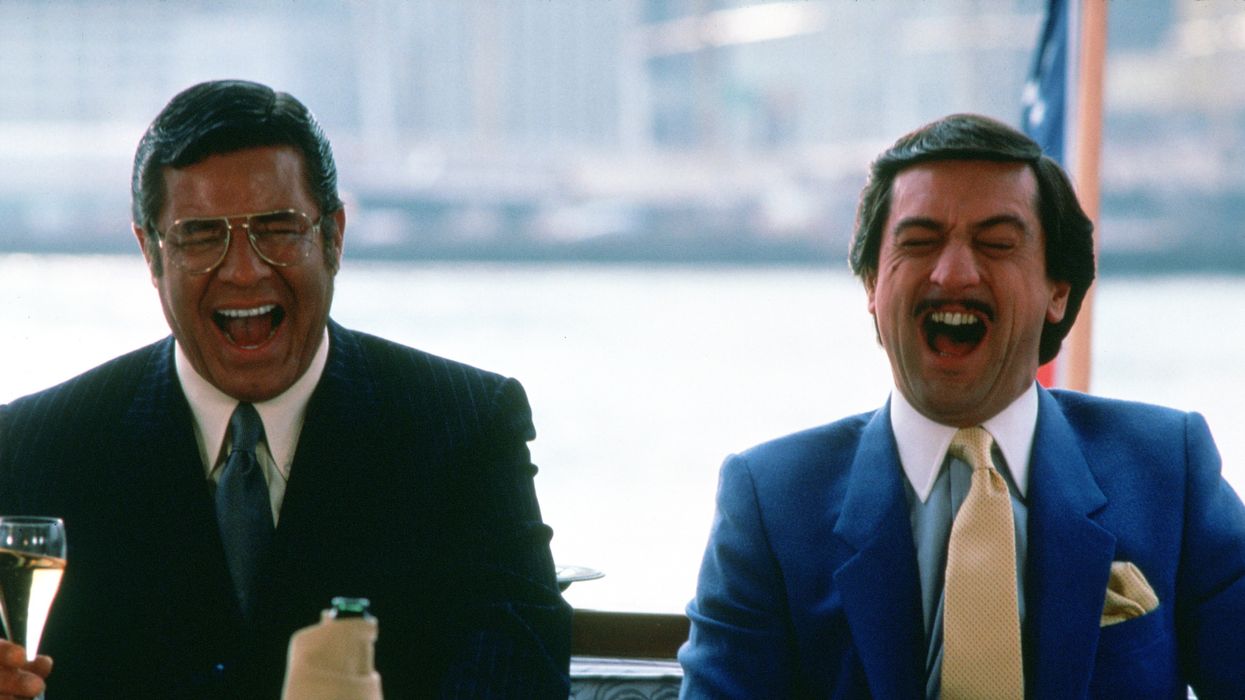Weird Moments in Film History: When Jerry Lewis Met Martin Scorsese in 'The King of Comedy'
While the tributes to Jerry Lewis pour in, we look back at the time Jerry met Marty (and Bobby).

The movie world lost an icon this weekend when Jerry Lewis passed away at the age of 91, which led us to remember a specific moment in film history when some industry giants met in an unlikely way. After the brutal tone poem of Raging Bull, Martin Scorsese made two of the strangest (and best) films of his career: the magisterial (and criminally under-seen) After Hours and the relatively obscureThe King of Comedy. The latter is an intensely weird movie about a comedian (Robert De Niro) who gets it into his head that the best way to succeed is to kidnap Jerry Langford (Lewis), the biggest talk-show host in the country, in order to force the beloved figure to give him five star-making minutes on the air.
The film has a TV aesthetic, all flat lighting that makes it the opposite of Raging Bull's gorgeous hellscape. According to Scorsese, "I decided not to do any camera movement but to create this hermetically-sealed frame, like the kind of television world everyone was watching at the time. An almost antiseptic quality. So it was just the opposite of what we had done in Taxi Driver. Just to let it go and play with the actors."
"To see myself – because I had no mask or no disguise that I'm used to seeing this silly Jerry hide behind – it was doubly frightening."
The harsh lighting and unglamorous photography of DP Fred Schuler make for a deliberately ugly world, and De Niro's performance as Rupert Pupkin, the deranged comedian/kidnapper, is one of the actor's most willfully bizarre performances. It's Lewis, though, who makes the enterprise shine with the genuine wattage he brings to Langford, the beloved TV host. No other actor could have given the role such gravitas. Lewis, for his part, loved the script, recounting in an interview how he spent weeks prepping with Scorsese and De Niro: "Their questions to me were related to why I have no anonymity and what's it like being a celebrity." They used Lewis' musings to inform the Langford character and the script, including this classic sequence:
The star had conflicts with De Niro, whose method acting precluded any sort of friendship on the set (Lewis, of his co-star said, "De Niro has obviously never heard Noel Coward's advice to actors about remembering the lines and trying not to bump into the furniture.") There were also conflicts with Sandra Bernhard, who plays Rupert's equally weird friend Masha, deputized to watch/terrorize him while he's tied up during the kidnapping. Watching this scene, it's not terribly difficult to see why.
When the film was released,The New York Times noted that while it wasn't an "absolute joy by a long shot but, in the way of a film that uses all of its talents to their fullest, it's exhilarating." The film was a box office flop, but over the years, it has become a minor classic. Check out this interview, where the star discusses the movie.
For Lewis, the role was a breakthrough: the first time in his career when he played outside of the persona he'd honed for decades. Scorsese has said, "He had to look as if nothing were going on – as if he were just walking along the street. He wasn't used to acting that way, and he had to keep his faceless than elastic. That's very hard to do."
Lewis gives a look into the psychic abyss of the professional comedian, a clown who clings to his neuroses for fear that, without them, he'll have no edge. As evidenced by the clip above, Lewis ultimately had great affection for the movie, which showed the versatility of an icon who was able to step back and look at the phenomenon of celebrity from the inside, to give the world a master class in the psychology of the comedian that even left the director asking, "It wasn't a comedy, was it?"











